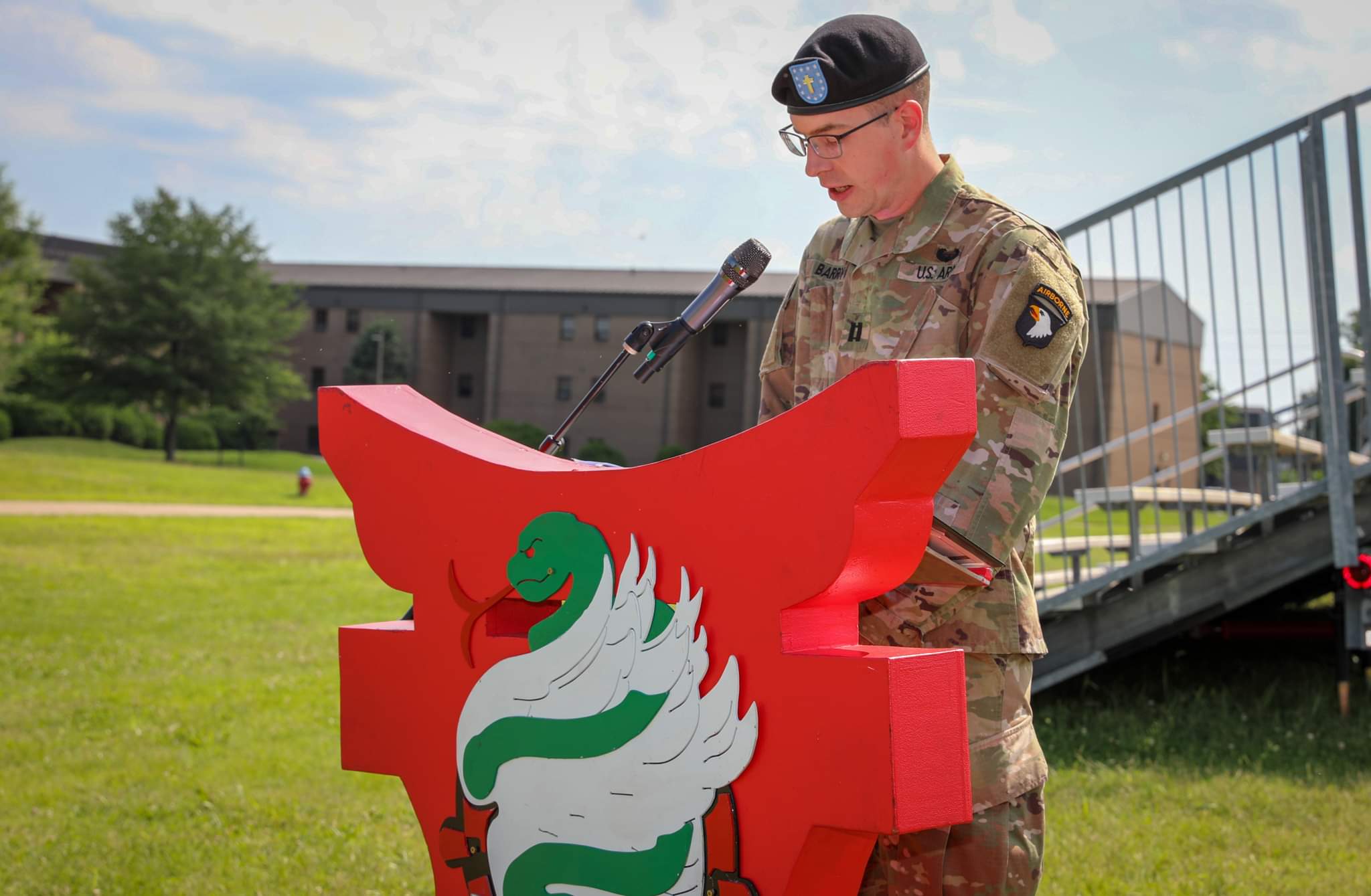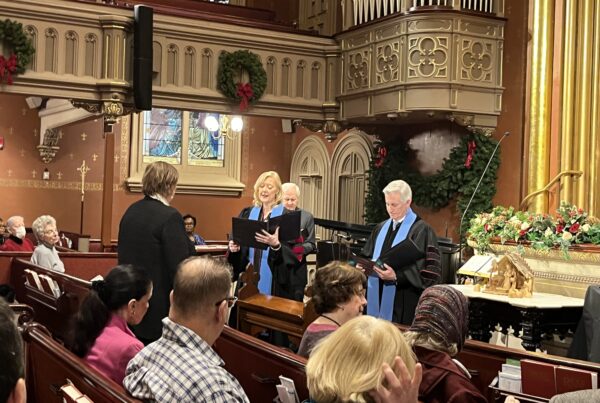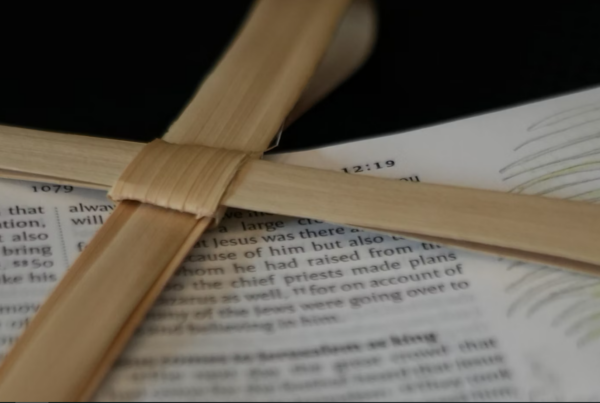“If you do not stand in faith, you shall not stand at all” (Isaiah 7:9). Early one August morning, in a Louisiana hurricane season storm, I spoke these words to our Battalion’s leaders. We were exhausted, weather beaten, and covered in sweat and mud as we faced once again an “enemy force” at the Joint Readiness Training Center. I had been covering multiple Battalions for nearly a month—including responding to some of the darkest, most difficult crises you could imagine. I needed this “Word of the Day” from Isaiah as much as our leaders did.
Later on, as the fog of war cleared and we regrouped, several leaders told me that these words—along with other ancient words from the prophet Isaiah during the rotation—had helped pull the team through, as a tribe (as a family). I said a silent prayer of gratitude for God giving me not just the words to speak but also the courage to speak them.
Military chaplains uniquely speak from their faith perspective to a pluralistic environment—all while respecting the various faiths of all present. This means my “Word of the Day” is neither secular (merely a quote that any leader might say) nor religious (something one would say in a chapel service). Instead when I give a “word,” it is often spiritual (informed by my faith) yet applicable to the pluralistic setting in which I serve. A sacred text, like the Bible, can be used but in a story telling or moral teaching manner.
This is the line Chaplains walk: I represent the Reformed Church in America—I am called and appointed to “bring Soldiers to God and God to Soldiers”—and I am a U.S. Army Officer who proclaims and honors religious liberty for all beliefs. I am a Christian who is a Reverend, and I am a Soldier who is an Officer, advising on religion, ethics, morals, and unit morale. Here’s what my last year as an Army Airborne (Air Assault) Chaplain has looked like—and how Scripture has guided and comforted me.
Chaplain Bear and Chaplain Isaiah: caring for the souls of Soldiers
“Sergeant, check it out: Chaplain Bear is literally hauling around a trash bag of Bibles in a thunderstorm.” By this point of Joint Readiness Training at Fort Polk, Louisiana—which many call the “swamp”—a group of Soldiers had begun calling me “Chaplain Bear.” I once told some fellow Chaplains about my “bear” worldview: I am aggressive about my ministry philosophy and practices—and most especially about caring for the souls of our Soldiers—and will get as grumpy as a bear if anyone asks me to compromise this care or sacrifice my spiritual practices or family. A group of Soldiers in Louisiana picked up on this story and began affectionately calling me “Chaplain Bear” after I scrounged “Meal, Ready-to-Eat” (MREs) for them. I also returned with “soul food”: the trash bag of Bibles. I probably gave away 70 Bibles that rotation, as well as maintained a supply of religious texts from all major faith groups.
As a Chaplain, I often consider the prophet Isaiah’s example (ca. 740-690 BC). He is a prophet to the king’s court—an expert at understanding how religions and cultures will affect the kingdom—but also first and foremost a pastor who speaks the truth. He is a teacher and a preacher (e.g., Isaiah 7:1-9; 38-39). He is Chaplain Isaiah. I want to emulate Isaiah’s example. As his nation faced war and international political turmoil around 735 BC, Isaiah confidently brought spiritual words of comfort and truth to his commander (Isaiah 7:1-3). Isaiah’s “word” and ministry philosophy is “stand in faith”—with God, one another, and your principles (Isaiah 7:4-9).
Holding a ministry philosophy, deeply rooted in one’s calling, is critical in high speed military ministry. Last year, I served with the only airborne regiment to participate in all major conflicts since the invention of airborne warfare: the “Rakkasans” of the 101st Airborne Division (Air Assault). This storied unit is intense. I was Chaplain for the “Assurgam Rakkasans,” the legendary Battalion of logistics and medical Airborne Soldiers who landed on D-Day with the “Band of Brothers.” Each day with the tribe of Rakkasans is preparation to defend the U.S. and its allies. Here are four ministry insights from the Book of Isaiah that guided me and that I regularly shared.
Do not lose heart
“Do not lose heart,” Isaiah says (Isaiah 7:4). I regularly need these words. There are days when chaplaincy in a Battalion is exhausting. Unique among ministers, military chaplains share in the exact hardships and conditions as their “parish.” This is how we gain credibility. As I face the metaphorical and real “swamps” with Soldiers, I am reminded of Jesus, who shared in the suffering of humanity.
I see God in the small moments, like when I see in prayer Jesus speak to a Soldier; or when a Soldier in confession finds freedom; or when someone takes the Lord’s Supper and their face lights up; or when at PT (morning Physical Training), someone calls me “Chap,” or “Reverend,” or “Father.” These moments renewed my heart and ultimately made me grieve the day when I handed off this Battalion to a new Chaplain. I silently prayed, “O God, thank you for the seeds you’ve planted here. I once was tired beyond measure, but now it is painful to leave these people.”
Be careful
In the same verse, Isaiah also says, “Be careful” (Isaiah 7:4). I remember these words as I think upon what’s next. Much of my life and future is up to the needs of the U.S. Army. As an Officer, I go where I am sent. This regularly reminds me to cautiously seek goals and positions, all with the understanding that everything could change at any given moment. All it takes is one set of Orders. There is a hidden freedom here.
While the Orders often mean being apart from my wife, Kalene—which is very difficult—the Army also provides opportunities and incredible care. This also leads a person of faith to lean all the more on the providence of God. You quickly see in this job that the not-selected for “this” in one season means being selected for “that” in another. This makes one cautiously examine future plans and regularly say, “Remember, it is still military chaplaincy, no matter what kind of unit I’m in.” It makes you hold everything loosely.
Retrospect is just that—retro, looking back. When I look back at my ever-changing and often unpredictable life as an Airborne (Air Assault) Chaplain, I can see what God has done and that gives perspective. It prompts me to be cautious and optimistic. For example, instead of seeing time apart from Kalene as a negative, I see it as a time for extra effort into personal goals that can accomplish greater ministry. I then look at “retrospect” ministry to recognize what my efforts have accomplished for the tribe (family) God called me to.
Keep calm
“Keep calm,” the prophet also tells us (Isaiah 7:4). I am reminded of this time and again. The future in this profession is often uncertain, but God reveals his will. I once fretted over opportunities to teach my Soldiers, but near the end of my time at the 101st Airborne Division (Air Assault), leaders would ask me to teach them to deliver hope—how to “protect the tribe.” God brought the opportunities; I did not need to worry. I just needed to keep calm and trust that God would do his work. Much changed in my two-plus years with the Rakkasans. Much will also change in the next two. But the need to keep calm by trusting in God remains.
Do not be afraid
In Isaiah 7:4, the prophet also tells us, “Do not be afraid.” That is where I land today. Fear can drive me, if I let it. It makes a lot of chaplains do things they shouldn’t. But we should only fear God. Like Chaplain Isaiah, military chaplains are responsible for fearlessly advising leaders. Because Soldiers can speak to chaplains in 100 percent confidentiality, chaplains have a pulse on the trends of the unit’s morale like no one else. This provides chaplains the unique opportunity to shape both policy and leaders; chaplains also shape Soldiers by encouraging them to execute the mission of commanders.
Ultimately, military chaplains face the fear of war with their “parish.” Isaiah’s words of assurance empower me to confront the fears that often exist in my occupation and to invite those whom I work among to face fear with faith. If it’s the gates of hell of war—a place I thought I would go when I arrived at the Rakkasans—then I will go there if asked. If it is months away from Kalene, I will go there. If it’s facing the ups and downs of this job, I will go there. But I can only do these things because of the power of Scripture and prayer in my life.
Stand in Faith with Chaplains
As I encourage others to stand in faith, I become evermore aware of my own need for prayer. None of us stand alone, no chaplain, pastor, or prophet; even bears have a tribe, a family. Please stand with military chaplains with your prayers and encouragement. May we each stand in faith, deeply rooted in our calling and ministry philosophy, as Chaplain Isaiah did.
The views presented are those of the author and do not necessarily represent the views of the U.S. Department of Defense or its components. The appearance of U.S. Department of Defense visual information does not imply or constitute endorsement. The photos and operational content of this article was approved for public release by the Public Affairs Officer of the 101st Airborne Division (Air Assault).
Rev. John D. Barry
Rev. John D. Barry (MA, MDiv) is an Active Duty Chaplain (Captain) in the U.S. Army. John is ordained and endorsed by the Reformed Church in America. Prior to military chaplaincy, John was an author, Bible scholar, nonprofit founder, and pastor.



